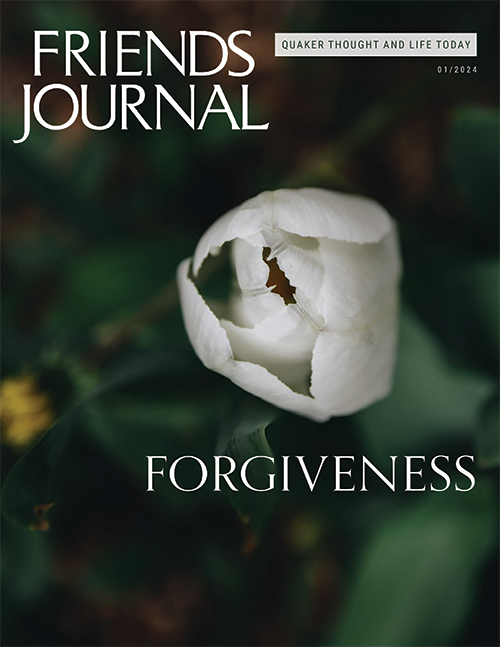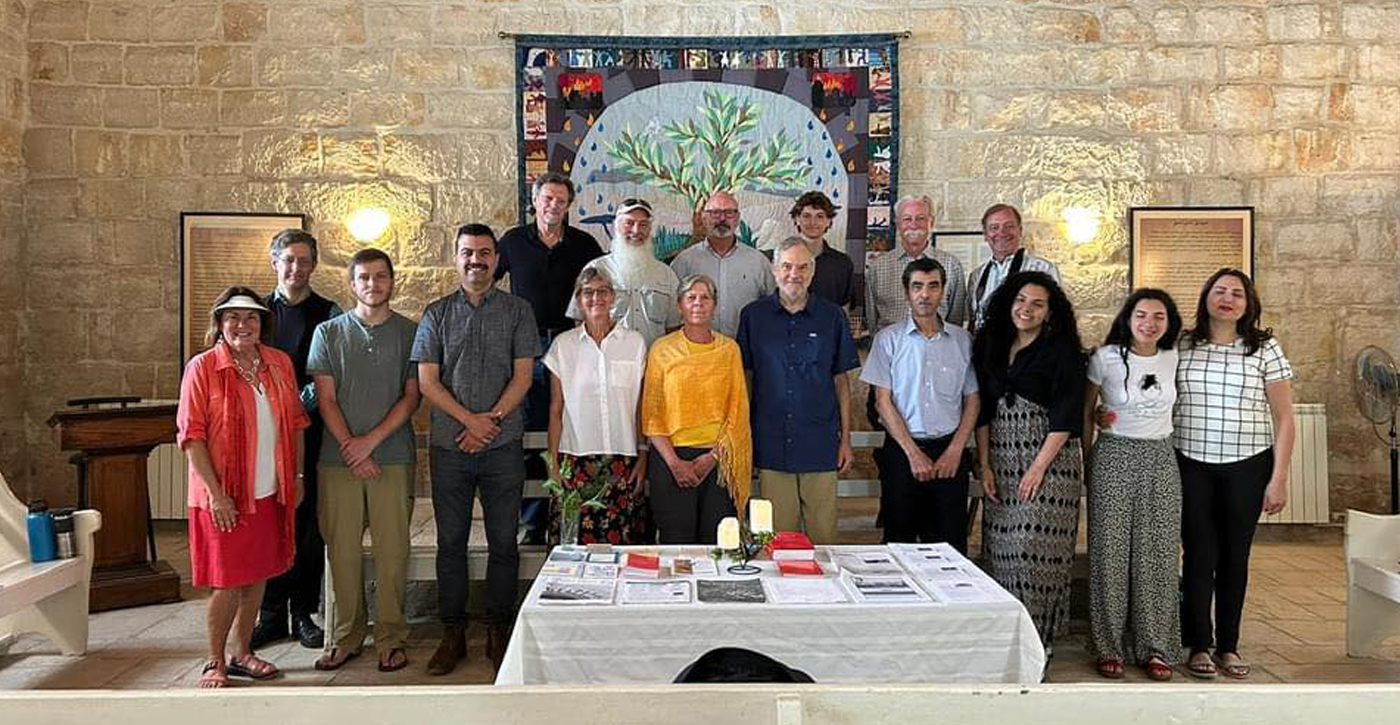Constant search for God in all situations
Thanks to Steve Chase for sharing his traumatic experience in the West Bank and word of U.S. Quakers’ increasing efforts to work for peace (“Speaking Up for Palestinian Rights Now,” FJ Nov. online; Dec. 2023 print).
Several Colorado meetings are holding brief post-worship called meetings to support Friends Committee for National Legislation’s urgent call for an end to violence in Israel–Palestine and development of structures for ongoing, unified peace. Congressional representatives are hearing these calls for action now.
Anne Remley
Boulder, Colo.
Are Quakers really being led by the Light to speak up for the rights and safety of Palestinians only, as this article suggests? Are we really being led to take sides?
The unique gift that Quakers bring to injustice and conflict is seeing truth clearly. Truth arises from, but is not the same as, facts. One of those facts is that Hamas and other militant Palestinian groups are committed, in writing and by their actions, to the destruction of Israel and Jews everywhere. The dead bodies of 1,400 Israelis are the most recent evidence of that. Another fact is that after creating opportunities for a two-state solution that were rejected by Palestinian leaders, Israel has spent decades forcibly establishing Jewish settlements that displaced Palestinians from their homes and undermined the possibility of such a solution. In daily life, it is a fact that Israel has deliberately and tragically created an apartheid state. In military conflicts, it is a fact that far more Palestinians than Israelis have died and are dying now, as I write this.
Those are facts, but what is the deeper truth the Light shows us? For me, it is that neither side has let themselves be guided to make the hard and sacrificial commitment necessary to achieve a just and peaceful way to live together. Religion, identity, old and new wounds, and uncompromising claims to territory and homeland have made both sides hard and unyielding, and have been cultivated as a political strategy. Quakers need to see clearly and speak plainly about the damage inflicted by these attitudes, and the need for both sides to create a shared commitment to nonviolence, communication, understanding, healing, and peace.
To quote from the mission statement of Ramallah Friends School in the West Bank, it is the role of Friends to be “a living expression of a religious life,” and be in “constant search for God in all human situations.” We need to encourage Palestinians and Israelis to be “committed to helping each person recognize her or his responsibility as a caring member of the school, community, nation and global family where ‘each lives for the other and all live for God,’” as the statement continues. We need to speak this deeper truth to Palestinian, Israeli, and American power.
Albert Bellg
Appleton, Wis.
Adding dimension to the struggle
As I was reading the book review section of the November 2023 issue, I really appreciated the books on Palestine and Israel. That material helped me see how painful and intractable the struggle there has been for a long time, which added dimension to the current frightening and violent situation. And the rest of that extended section was wonderful too. But it almost slipped my mind to send in this note of appreciation until the review of the movie Rustin appeared in my email box. Thank you to the book review editor and all the reviewers for giving readers so much fresh material, so well chosen and written.
Karie Firoozmand
Timonium, Md.
Relations with Indigenous peoples in the Americas
Wow! I somehow thought Quakers were not involved in the destruction of society regarding the Native peoples of the United States (“The Lasting Trauma of Quaker Indigenous Boarding Schools,” QuakerSpeak.com Nov. 2023). Thank you for sharing this information. It seems Quakers are not without blame in many things, including ownership of slaves.
Becky Miller
Mennifee, Calif.
The number of Quakers in Canada is much smaller than in the United States, and as far as I know, only a small number taught in Indigenous boarding schools. But I have not heard of Quaker opposition to them, when they existed, and I don’t think that we today feel much responsibility for what our predecessors did.
The words in this video are the most moving Quaker comment on the subject I have seen. The wrongness of our participation and the difficulty we have in accepting that “following our Light” could be so misguided is hard to accept.
Peter Harkness
Ottawa, Ont.
Thank you all for this inspirational interview with Friend Paula Palmer. I know I have vital work to do becoming better acquainted with the Lenni-Lenape, on whose ancestral lands I now live. Gaining fascinating knowledge from the Hopi in Arizona was an important first step in the many steps that call to me. Fortunately, Birmingham (Pa.) Meeting, where I now attend, welcomes and enjoys the work of an active committee, Toward Right Relationship with Native Peoples, from whom and with whom I can learn more. I am grateful for the guidance of Friends.
Tom Martin
Kennett Square, Pa.
Where Quakerism and Pentecostalism intersect
I enjoyed Andy Stanton-Henry’s article on Quakerism and Pentecostalism (“All the Way Back to George Fox,” FJ Oct. 2023). I have had some similar experiences but not nearly extensive.
Charismatic experiments have taken place in a number of Quaker settings, including 40 or so years ago in Ohio Yearly Meeting.
My only disappointment about this article is the apparent lack of awareness of the main place where Quakerism and Pentecostalism intersect vigorously: Africa. My wife and I served for five years at Friends Theological College in Kaimosi, Kenya, where we encountered the surprising reality that most Quakers in Kenya and East Africa are vigorously Pentecostal. That development over the last 50 years has not been without controversy, and during our time 20 years ago, the growth of Pentecostal forms of worship formed the fault line between younger and older Quakers.
Not Pentecostal ourselves—we have spent time both in pastoral and unprogrammed Quakerism—we found ourselves taking sides with the young people and in favor of “freedoms of worship,” in part because the young people were advocates of financial transparency over against the ingrained practices of mismanagement and corruption. We did appreciate the spiritual vitality that Pentecostal forms of worship brought, in comparison to a style of worship where meeting for business had completely engulfed and overwhelmed the meeting for worship. We also experienced some of the excesses and theatricality that can accompany Pentecostalism. In any case, Friends who wonder if there is anything to be learned, any Light to be shed, in our practices from an intersection of Quakerism and Pentecostal worship, some experience of Kenyan Quakerism might prove instructive, especially as the numbers of Friends in the United States decline precipitously.
Patrick Nugent
Kettering, Ohio
Supporting causes and organizations
Excellent points from Judith Appleby in “God Loves a Cheerful Giver” (FJ Dec. 2023)! There are organizations to which I shall continue to donate automatically (our meeting and Canadian Friends Service Committee, to name two), those that I’ll discontinue, and those that I’ll spend time discerning before giving or not giving. Being a cheerful giver is a goal to embrace wholeheartedly! Thank you, Friend!
Donna Sassaman
Cowichan Bay, BC






Comments on Friendsjournal.org may be used in the Forum of the print magazine and may be edited for length and clarity.